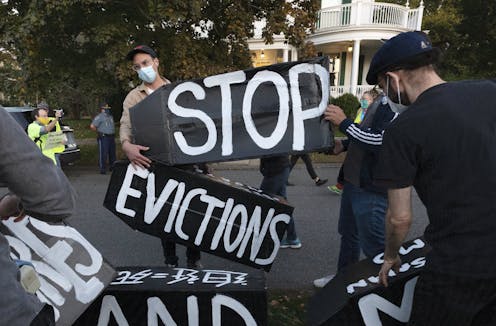3 essential reads about the CDC's expiring moratorium
- Written by Bryan Keogh, Senior Editor, Economy + Business

The White House and city officials across the country are scrambling to avoid an eviction crisis[1].
The federal housing eviction moratorium that the Centers for Disease Control and Prevention put in place in September 2020 expires on July 31, 2021[2]. After that, millions of Americans who owe tens of billions of dollars[3] in unpaid rent will lose that protection and may face eviction and a loss of their homes. Meanwhile, a group of landlords is suing the U.S. government[4] to recover damages it says its members suffered from not being able to evict tenants who didn’t pay rent.
Although Congress allocated more than $46 billion[5] for emergency rental aid, most of it hasn’t reached many of the people who need it as state and local governments struggle to distribute the money. Many renters are unaware[6] relief is available.
We’ve been following the issue throughout the pandemic and picked three articles from our archive to get you up to speed.
1. Housing insecurity is a preexisting condition
Millions of Americans lost their jobs[7] when the COVID-19 pandemic forced lockdowns across the country in March 2020, while many others strained[8] to put food on the table or pay the rent.
But even before the crisis, tens of millions of people struggled to pay for housing[9], according to University of Michigan professors Roshanak Mehdipanah[10] and Gregory Sallabank[11]. As of 2018, an estimated 38 million, or over a quarter, of U.S. households spent at least 30% of their income on housing-related expenses. About 12 million spent half their income, making it hard if not impossible to afford other essential expenses like food and health care.
The CDC moratorium and similar eviction bans in states and cities across the country have helped low-income Americans endure the pandemic, but these solutions were always going to be short term, Mehdipanah and Sallabank explain.
“While these interventions have reduced a source of anxiety and stress for households, they are temporary,” the scholars write. “Once they expire, these people will still have the same debts, same housing costs and the same bleak financial picture.”
Read more: Another housing crisis is coming – and bailouts and eviction freezes won't be enough to prevent many from losing their homes[12]
2. Evictions rising in some states
While the federal moratorium has ensured some renters don’t lose their homes, many others haven’t been so lucky as evictions continued throughout most of the pandemic[13].
For example, in Idaho, which didn’t have a statewide eviction ban, evictions fell in April and May 2020 as most courts closed because of local lockdowns. But when courts reopened, evictions headed back toward 2019 levels. Other states and cities also saw eviction spikes after bans expired.
As coronavirus relief funds run out and the CDC eviction ban expires, more renters throughout the country will likely face eviction[14], argue Benjamin Larsen[15] and McAllister Hall[16], who research housing issues at Boise State University.
“Those households may still be feeling the pressure from the pandemic – and may not be able to come up with current rent, much less months of back rent they might also owe,” they write. “The aid may be coming to an end, but the potential for an eviction crisis remains – in Idaho, and around the nation.”
Read more: Despite federal moratorium, eviction rates returning to pre-pandemic levels[17]
3. Eviction courts favor landlords
Before landlords can evict a renter, they first must take them to court.
But eviction courts aren’t about due process and getting a fair hearing[18], explains Katy Ramsey Mason[19], a law professor and director of the Medical-Legal Partnership Clinic at the University of Memphis.
States created eviction courts to offer landlords a “summary process” to ensure cases are handled very quickly – sometimes in less than a week. As a result, the odds are “stacked heavily in favor of landlords,” she writes.
“Tenants who go through eviction court not only could lose their homes, but the final judgment also becomes a black mark on their credit reports, making it more difficult for them to obtain safe and affordable housing in the future,” Ramsey Mason writes. “The current court process is not designed to account for these consequences, especially on the mass scale resulting from the pandemic.”
Read more: Despite federal moratorium, eviction rates returning to pre-pandemic levels[20]
Editor’s note: This story is a roundup of articles from The Conversation’s archives.
[Get the best of The Conversation, every weekend. Sign up for our weekly newsletter[21].]
References
- ^ are scrambling to avoid an eviction crisis (www.washingtonpost.com)
- ^ expires on July 31, 2021 (www.cdc.gov)
- ^ who owe tens of billions of dollars (www.nytimes.com)
- ^ is suing the U.S. government (www.bloomberg.com)
- ^ more than $46 billion (www.cbsnews.com)
- ^ Many renters are unaware (nlihc.org)
- ^ lost their jobs (fred.stlouisfed.org)
- ^ many others strained (www.cbpp.org)
- ^ struggled to pay for housing (theconversation.com)
- ^ Roshanak Mehdipanah (scholar.google.com)
- ^ Gregory Sallabank (scholar.google.com)
- ^ Another housing crisis is coming – and bailouts and eviction freezes won't be enough to prevent many from losing their homes (theconversation.com)
- ^ evictions continued throughout most of the pandemic (evictionlab.org)
- ^ will likely face eviction (theconversation.com)
- ^ Benjamin Larsen (www.boisestate.edu)
- ^ McAllister Hall (www.boisestate.edu)
- ^ Despite federal moratorium, eviction rates returning to pre-pandemic levels (theconversation.com)
- ^ But eviction courts aren’t about due process and getting a fair hearing (theconversation.com)
- ^ Katy Ramsey Mason (www.memphis.edu)
- ^ Despite federal moratorium, eviction rates returning to pre-pandemic levels (theconversation.com)
- ^ Sign up for our weekly newsletter (theconversation.com)

















